Change Research/ CNBC Poll: July 10-12, 2020
Key Takeaways
- Biden leads Trump by 10 points among likely voters nationally, and by 6 points in the battleground, steady over the past two weeks.
- Majorities disapprove of Trump’s handling of the economy, helping your pocketbook, COVID-19, and ensuring relief for COVID-19 goes to those who need it.
- A 59% majority in the battleground now say things are worse when it comes to the impact of COVID-19, up from 55% two weeks ago, and a 45% plurality in the battleground say things are reopening too quickly, including 60% in AZ and 62% in FL.
- The economy, jobs and cost of living is the #1 issue of concern to battleground voters (52%), 61% rate the US economy and the US jobs market negatively, and 81% of voters support more stimulus payments to individuals to deal with the impact of COVID-19.
Voters are rejecting GOP governance and Trump
Only 43% of voters nationally approve of Trump’s overall job performance, unchanged over our last two waves, and 45% approve of Trump’s performance in the battleground, a new low. Strong approval is also at a new record low of 35% in the battleground, while 51% strongly disapprove.
These numbers cannot be disconnected from voters’ dissatisfaction with the President’s handling of COVID-19. Only 43% of battleground voters and 41% of voters nationally approve of his handling of COVID-19, matching the record lows measured in our late June surveys.
Majorities nationally and in the battleground also disapprove of the job Trump is doing on every other issue except for the stock market. Majorities of voters disapprove of his job handling the economy, helping your pocketbook, and ensuring economic relief for COVID-19 goes to those who need it most, rather than the wealthy and well-connected. Notably, voters were significantly less likely to strongly approve of the job Trump is doing:
- 35% of battleground voters strongly approve of his handling of the economy;
- 28% of battleground voters strongly approve of the job he is doing helping their pocketbook;
- 30% of battleground voters strongly approve of the job he is doing ensuring economic relief for COVID-19 goes to those who need it most, rather than the wealthy and well-connected.
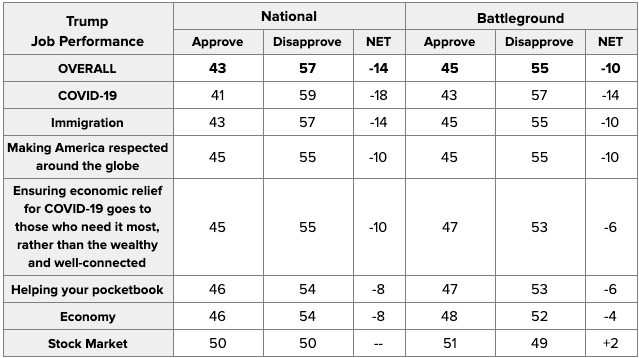
Voters are not just unsatisfied with Trump and Republicans, they also trust Biden and Democrats more to handle these issues. Biden and Democrats continue to hold their greatest advantages on making health care more affordable and handling COVID-19, while voters are split evenly over who would do a better job on ‘the economy’ in the battleground states. When it comes to helping the middle class, Biden and Democrats have the clear advantage.
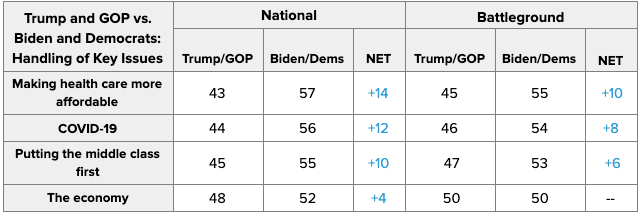
Biden leads Trump by 10 points nationally (51% Biden, 41% Trump) and his lead across the battleground remains 6 points (49% Biden, 43% Trump) as it was in late June. Biden is ahead in all six battleground states.
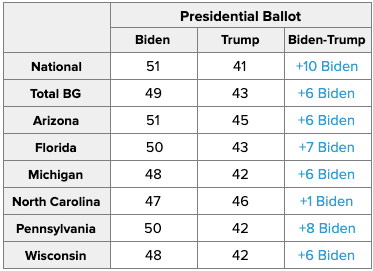
Voters are also rejecting GOP governance more broadly. In Florida a 57% majority disapprove of Republican Governor Ron DeSantis’ handling of the outbreak. In Arizona, a stunning 71% disapprove of the job Republican Governor Doug Ducey is doing handling COVID-19. Democratic Governors, on the other hand, receive much better ratings for their handling of the outbreak: 55% approve of Gretchen Whitmer’s handling of COVID-19 (50% strongly approve), 55% and 56% approve of the jobs Tom Wolf and Tony Evers are doing, respectively, and 51% approve of Roy Cooper’s handling of the outbreak. The rejection of GOP governance is translating to strong margins for Democratic candidates for Senate in Arizona, Michigan, and North Carolina. The Democratic candidates lead by 7 points in each of those races.
COVID-19 concerns are deep and steady
Four months into the pandemic, 73% of voters nationally and 71% in the battleground say they have serious concerns about the coronavirus, the same level of concern we saw two weeks ago. The serious concerns are highest in Florida, the new epicenter of the outbreak, followed by the other Sunbelt states. This past week also revealed the true extent of the disparate impact of COVID-19 on communities of color, and unsurprisingly they remain the voters most concerned about COVID-19. We also see 18-34 year olds are now the age cohort most likely to express serious concerns about COVID-19, surpassing even seniors, as they are now the group most likely to test positive for the virus.
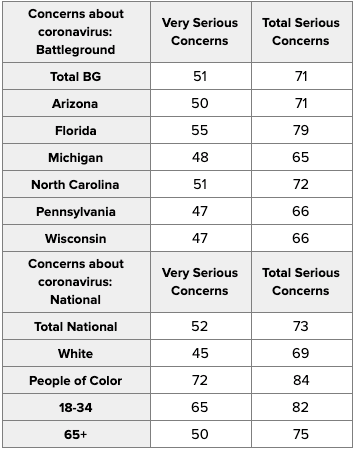
While the number reporting serious concerns remains consistent, a larger share of voters say that when it comes to the impact of COVID-19, things are getting worse. A 59% majority in the battleground now say things are worse, up from 55% two weeks ago. While it was the increase in the Sunbelt states driving the pessimism last wave, this time we see the greatest increases in the Rust Belt states, as those states are starting to deal with a resurgence of the virus. Only 55% of Republicans now say that things are getting better, down from 59% in late June, and 59% of independents say things are getting worse (+6 since late June). Nationally 19% of Republicans now say that things are getting worse, up from 16% in late June, and 70% of independents say things are getting worse (+11 since late June).
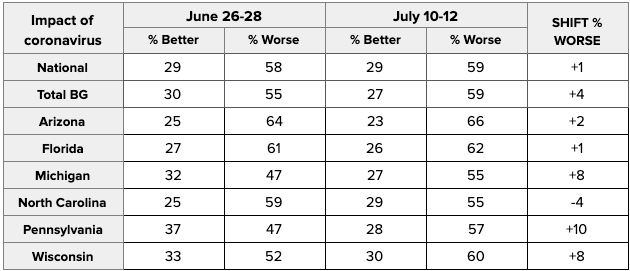
It is harder for voters to deny the reality of the spread of the virus as an ever increasing number of people report a personal connection to someone with COVID-19: 62% of voters nationally (up 5 points over the past 2 weeks and 10 points over the past month), and 60% of battleground voters (up 5 points over the past 2 weeks and 10 points over the past month) say they or someone they know personally has contracted the virus.

Pluralities nationally and in the battleground continue to say things are reopening too quickly, but the uptick over the past month is particularly acute in key battleground states. Six-in-ten voters in Arizona and 62% of voters in Florida now believe things are opening too quickly, an 11-point increase in both states over the past month.
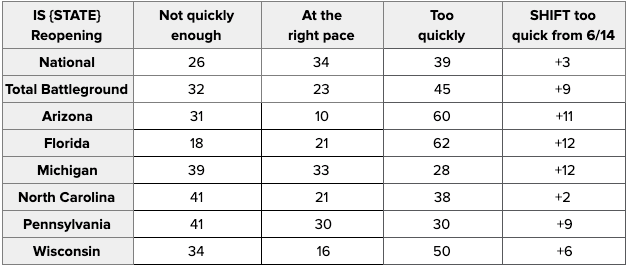
In late June we saw an uptick in the numbers taking precautions against COVID-19 as the hospitalization rates grew. This week we see the numbers taking precautions remain as high or higher. Particularly noteworthy is the fact that 78% of voters are now wearing a mask, and mask wearing is increasingly bipartisan: 55% of Republicans, 75% of independents, and 98% of Democrats are wearing masks in public. Voters are also increasingly restricting their activities: 52% majority in the battleground now say they are sheltering at home (+4 since late June), 61% are not going to restaurants and bars (+4) — the highest numbers we have measured since mid-May).

The number reporting that activities are safe in the battleground states was the same or less than two weeks ago. The only activity that voters were more likely to say was safe was ‘attending an indoor campaign rally’ — there was a 4 point increase in the number saying this was safe, driven by Republicans (52% safe in late June, 61% safe today) — but it remains one of activities voters consider least safe in this survey. Only one activity is considered safe by a majority of voters, shopping, and Rust Belt states continue to be more likely than Sunbelt states to believe activities are safe, reflecting the reality in those states.
Voters rate the US economy and jobs market negatively and support more direct relief
The economy, jobs and cost of living is the #1 issue of concern to battleground voters (52%) and nationally (49%) followed by COVID-19. A large 61% majority in the battleground currently rate the US economy and the US job market negatively, 57% are worried and uncertain about the year ahead when it comes to the US economy and 61% are worried and uncertain about the unemployment rate.
But even those numbers obscure the pain at the personal level. Fully 50% of battleground voters say they or someone in their household lost wages or had a salary cut due to COVID-19 and 36% of voters are currently experiencing reduced pay; 37% of battleground voters report they or something in their household has lost a job or been furloughed due to COVID-19 and 26% of voters in these key states are still currently experiencing this.
No wonder 81% of voters in the battleground and nationally – including 68% of Republicans in the battleground – support more stimulus payments to individuals to deal with the impact of COVID-19.
Battleground Sample & Methodology
National Survey Sample & Methodology
For media inquiries, please email [email protected]
Change Research conducted a poll of 3,739 likely voters June 26-28, 2020 across 6 competitive battleground states: Arizona, Florida, Michigan, North Carolina, Pennsylvania, and Wisconsin. A companion national survey of 1,663 likely voters was also conducted June 26-28, 2020. Unless otherwise stated, the results presented in this analysis are among battleground state voters. The margin of error, as traditionally calculated, is ±1.6% for the battleground and ±2.4% for the national poll. Change Research reaches voters via targeted online ads that point people to an online survey instrument. Our Dynamic Online Sampling establishes and continuously rebalances advertising targets across region, age, gender, race, and partisanship to dynamically deliver large samples that accurately reflect the demographics of a population. Post stratification was done on state, gender, age, race, education, and 2016 presidential vote.
This is the eighth in a series of bi-monthly battleground state and national surveys that CNBC & Change Research will conduct in 2020.
